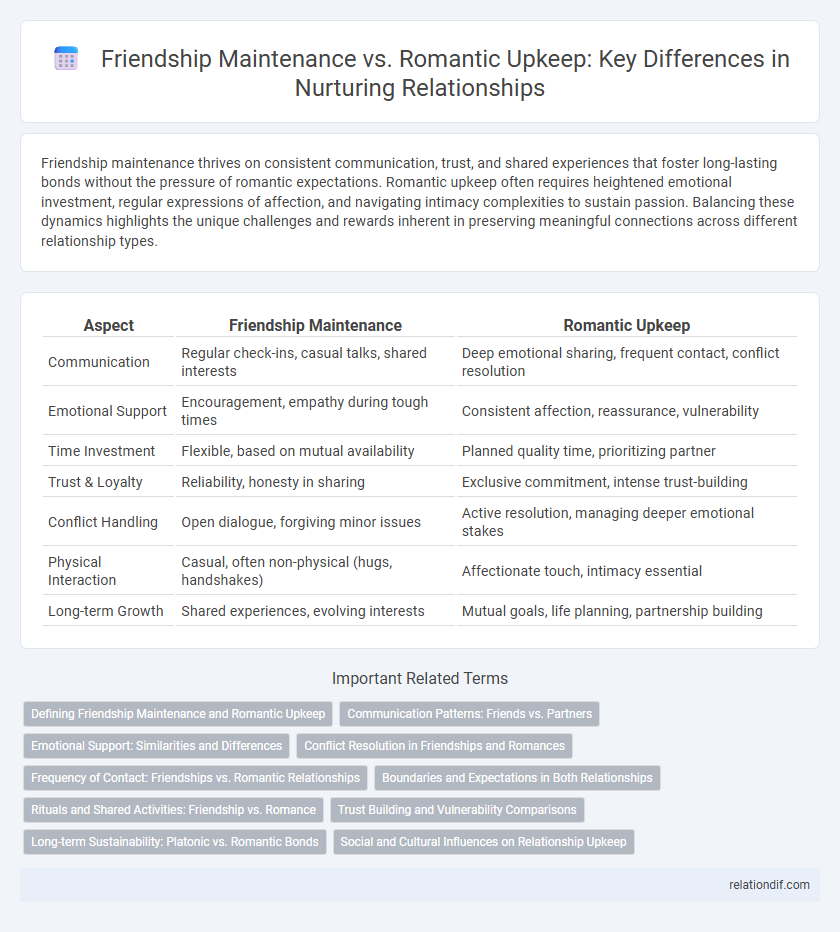Friendship maintenance thrives on consistent communication, trust, and shared experiences that foster long-lasting bonds without the pressure of romantic expectations. Romantic upkeep often requires heightened emotional investment, regular expressions of affection, and navigating intimacy complexities to sustain passion. Balancing these dynamics highlights the unique challenges and rewards inherent in preserving meaningful connections across different relationship types.
Table of Comparison
| Aspect | Friendship Maintenance | Romantic Upkeep |
|---|---|---|
| Communication | Regular check-ins, casual talks, shared interests | Deep emotional sharing, frequent contact, conflict resolution |
| Emotional Support | Encouragement, empathy during tough times | Consistent affection, reassurance, vulnerability |
| Time Investment | Flexible, based on mutual availability | Planned quality time, prioritizing partner |
| Trust & Loyalty | Reliability, honesty in sharing | Exclusive commitment, intense trust-building |
| Conflict Handling | Open dialogue, forgiving minor issues | Active resolution, managing deeper emotional stakes |
| Physical Interaction | Casual, often non-physical (hugs, handshakes) | Affectionate touch, intimacy essential |
| Long-term Growth | Shared experiences, evolving interests | Mutual goals, life planning, partnership building |
Defining Friendship Maintenance and Romantic Upkeep
Friendship maintenance involves consistent communication, mutual support, trust-building, and shared experiences to strengthen bonds over time. Romantic upkeep requires nurturing emotional intimacy, managing expectations, regular affection, and addressing conflicts to sustain passion and connection. Both emphasize ongoing effort but differ in emotional intensity and relational goals.
Communication Patterns: Friends vs. Partners
Friendship maintenance relies heavily on open and supportive communication, emphasizing active listening, shared experiences, and emotional validation without the pressure of romantic expectations. Romantic upkeep, however, often involves more frequent, intimate exchanges that address both emotional and practical aspects of the relationship, including conflict resolution and future planning. Understanding these distinct communication patterns helps preserve bond quality in friendships while nurturing growth and closeness in partnerships.
Emotional Support: Similarities and Differences
Emotional support in friendship and romantic relationships both provide essential comfort, empathy, and understanding, but friendships often emphasize consistent encouragement and non-judgmental listening without romantic expectations. Romantic upkeep typically involves deeper emotional intimacy, frequent reassurance, and managing vulnerability linked to romantic commitment. While both rely on trust and communication, friendship emotional support tends to be more stable and less emotionally intense compared to the dynamic nature of romantic partnerships.
Conflict Resolution in Friendships and Romances
Effective conflict resolution in friendships relies on open communication, mutual respect, and empathy to maintain trust and understanding over time. In romantic relationships, conflict resolution often involves balancing emotional intimacy with compromise and acknowledging shared goals to strengthen the bond. Both friendships and romances benefit from active listening and timely reconciliation, but romantic upkeep typically requires deeper emotional investment and continuous adaptation to partners' evolving needs.
Frequency of Contact: Friendships vs. Romantic Relationships
Frequency of contact differs significantly between friendships and romantic relationships, with romantic partners typically engaging in daily or near-daily communication to reinforce emotional bonds. Friendships often endure longer periods between interactions without weakening the connection, relying on quality rather than quantity of contact. Research indicates that consistent, meaningful engagement is crucial for maintaining romantic relationship satisfaction, whereas friendships prioritize shared experiences during less frequent meetings.
Boundaries and Expectations in Both Relationships
Clear boundaries and mutual expectations are essential for maintaining healthy friendships and romantic relationships, ensuring respect and trust in both dynamics. Friendships often prioritize emotional support and shared interests without the complexities of romantic intimacy, whereas romantic relationships require negotiating deeper emotional needs and physical boundaries. Understanding these differences helps prevent misunderstandings and promotes balanced interactions tailored to the unique demands of each relationship type.
Rituals and Shared Activities: Friendship vs. Romance
Rituals and shared activities in friendship, such as regular meetups, game nights, or collaborative projects, foster trust, mutual support, and long-term bonding without the emotional intensity found in romantic upkeep. While romantic relationships often rely on date nights, anniversaries, and intimate routines emphasizing emotional connection and physical closeness, friendships emphasize consistency and shared experiences that reinforce loyalty and understanding. These distinct patterns in ritualized interactions underscore how emotional investment and social needs differ between friendship maintenance and romantic relationship upkeep.
Trust Building and Vulnerability Comparisons
Trust building in friendship relies on consistent support and open communication, fostering a safe environment for vulnerability without fear of judgment. Romantic relationships often demand deeper emotional exposure and frequent reassurance, where vulnerability includes sharing intimate fears and future aspirations. While both connections require honesty, friendships emphasize steady reliability, whereas romantic partnerships involve navigating complex emotional interdependence.
Long-term Sustainability: Platonic vs. Romantic Bonds
Long-term sustainability in friendship relies on consistent communication, mutual respect, and shared experiences, which often require less intensive emotional labor compared to romantic upkeep. Romantic bonds typically demand ongoing emotional investment, physical intimacy, and conflict resolution efforts to maintain passion and connection. Platonic relationships benefit from stability and trust built over time, making their maintenance more resilient to everyday stresses and changes in life circumstances.
Social and Cultural Influences on Relationship Upkeep
Social and cultural norms significantly shape the maintenance strategies in friendships and romantic relationships, often dictating communication patterns, emotional expression, and conflict resolution methods. Friendship upkeep tends to emphasize mutual support and shared activities influenced by cultural expectations of social roles and group dynamics, while romantic relationships frequently prioritize intimacy and commitment shaped by societal values on partnership. These influences determine how individuals invest time and effort, with cultural context affecting the perceived importance and approach to preserving different types of relationships.
friendship maintenance vs romantic upkeep Infographic

 relationdif.com
relationdif.com